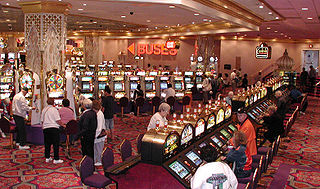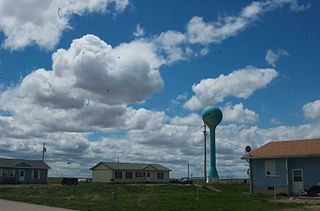Related Research Articles

Gambling is the wagering of something of value on a random event with the intent of winning something else of value, where instances of strategy are discounted. Gambling thus requires three elements to be present: consideration, risk (chance), and a prize. The outcome of the wager is often immediate, such as a single roll of dice, a spin of a roulette wheel, or a horse crossing the finish line, but longer time frames are also common, allowing wagers on the outcome of a future sports contest or even an entire sports season.
A minimum wage is the lowest remuneration that employers can legally pay their employees—the price floor below which employees may not sell their labor. Most countries had introduced minimum wage legislation by the end of the 20th century. Because minimum wages increase the cost of labor, companies often try to avoid minimum wage laws by using gig workers, by moving labor to locations with lower or nonexistent minimum wages, or by automating job functions. Minimum wage policies can vary significantly between countries or even within a country, with different regions, sectors, or age groups having their own minimum wage rates. These variations are often influenced by factors such as the cost of living, regional economic conditions, and industry-specific factors.

Native American gaming comprises casinos, bingo halls, and other gambling operations on Indian reservations or other tribal lands in the United States. Because these areas have tribal sovereignty, states have limited ability to forbid gambling there, as codified by the Indian Gaming Regulatory Act of 1988. As of 2011, there were 460 gambling operations run by 240 tribes, with a total annual revenue of $27 billion.
The effect of legalized abortion on crime is a controversial hypothesis about the reduction in crime in the decades following the legalization of abortion. Proponents argue that the availability of abortion resulted in fewer births of children at the highest risk of committing crime. The earliest research suggesting such an effect was a 1966 study in Sweden. In 2001, Steven Levitt of the University of Chicago and John Donohue of Yale University argued, citing their research and earlier studies, that children who are unwanted or whose parents cannot support them are likelier to become criminals. This idea was further popularized by its inclusion in the book Freakonomics, which Levitt co-wrote.
Victor Perlo was an American Marxist economist, government functionary, and a longtime member of the governing National Committee of the Communist Party USA.
Online gambling is any kind of gambling conducted on the internet. This includes virtual poker, casinos, and sports betting. The first online gambling venue opened to the general public was ticketing for the Liechtenstein International Lottery in October 1994. Today, the market is worth around $40 billion globally each year, according to various estimates.

The Indian Gaming Regulatory Act is a 1988 United States federal law that establishes the jurisdictional framework that governs Indian gaming. There was no federal gaming structure before this act. The stated purposes of the act include providing a legislative basis for the operation/regulation of Indian gaming, protecting gaming as a means of generating revenue for the tribes, encouraging economic development of these tribes, and protecting the enterprises from negative influences. The law established the National Indian Gaming Commission and gave it a regulatory mandate. The law also delegated new authority to the U.S. Department of the Interior and created new federal offenses, giving the U.S. Department of Justice authority to prosecute them.

In the United States, gambling is subject to a variety of legal restrictions. In 2008, gambling activities generated gross revenues of $92.27 billion in the United States.

Highland Park Senior High School is a public secondary school in Saint Paul, Minnesota, United States serving grades 9 through 12. It is located in the Highland Park neighborhood.

The National Gambling Impact Study Commission Act of 1996 is an Act of Congress that was signed into law by President of the United States Bill Clinton.

Reservations in the United States, known as Indian reservations, are sovereign Native American territories that are managed by a tribal government in cooperation with the federal Bureau of Indian Affairs, a branch of the Department of the Interior, located in Washington, DC. There are 334 reservations in the United States today. As of 2008, almost a third of Native Americans in the United States live on reservations, totaling approximately 700,000 individuals. About half of all Native Americans living on reservations are concentrated on the ten largest reservations.
Tribal-state compacts are declared necessary for any Class III gaming on Indian reservations under the Indian Gaming Regulatory Act of 1988 (IGRA). They were designed to allow tribal and state governments to come to a "business" agreement. A compact can be thought of as "negotiated agreement between two political entities that resolves questions of overlapping jurisdictional responsibilities Compacts affect the delicate power balance between states, federal, and tribal governments. It is these forms that have been a major source of controversy surrounding Indian gaming. Thus, it is understandable that the IGRA provides very detailed instructions for how states and tribes can make compacts cooperatively and also details the instructions for how the federal government can regulate such agreements.
Gambling in Omaha, Nebraska has been significant throughout the city's history. From its founding in the 1850s through the 1930s, the city was known as a "wide-open" town, meaning that gambling of all sorts was accepted either openly or in closed quarters. By the mid-20th century, Omaha reportedly had more illicit gambling per capita than any other city in the nation. From the 1930s through the 1970s, the city's gambling was controlled by an Italian criminal element.
California v. Cabazon Band of Mission Indians, 480 U.S. 202 (1987), was a United States Supreme Court case involving the development of Native American gaming. The Supreme Court's decision effectively overturned the existing laws restricting gaming/gambling on U.S. Indian reservations.
As a result of gambling, some are driven to extreme lengths to cover debt. Severely addicted gamblers spend most of their energy following their addiction. They cost companies loss of productivity and profit. Gamblers themselves may suffer from depression and bankruptcy. Some may go into severe debt and suffer anxiety because of it. The social costs to society are varied and include unemployment benefits, family services and medical treatment to gamblers.
I. Nelson Rose is an internationally known author and public speaker, and is recognized as one of the world's leading experts on gambling and gaming law. He is currently a Professor Emeritus at Whittier College and a Visiting Professor at the University of Macau. Rose is best known for his internationally syndicated column and 1986 book, Gambling and the Law. To further educate and inform on the subject, he also maintains a comprehensive website, "Gambling and the Law," which can be found at www.gamblingandthelaw.com.
John W. Kindt, MBA, J.D., LL.M., SJD, is a gambling critic and a Professor of Business and Legal Policy at the University of Illinois at Urbana-Champaign. Since 1990, Professor Kindt has probably been best known as one of the most well-published academics in issues relating to gambling. He has served as a senior editor, contributing author, and intermittent co-author of the United States International Gambling Report and United States International Gaming Report. Kindt's academic research and publications contributed to the enactment of the 1996 U.S. National Gambling Impact Study Commission, the U.S. Unlawful Internet Gambling Enforcement Act of 2006, and various other Federal and state statutes.
The National Coalition Against Legalized Gambling (NCALG) was a national organization that was against legalized gambling. Formed by Tom Grey, a Methodist minister, the organization educated communities about the negative effects of gambling. It became part of the Stop Predatory Gambling Foundation in 2008.
William R. Eadington (1946-2013) was an American economist and the founder of Gambling Studies. He served as the Philip J. Satre chair in Gaming Studies in the Department of Economics and the director of the Institute for the Study of Gambling and Commercial Gaming at the University of Nevada, Reno.
David Brendan Mustard is an American economist and the Josiah Meigs Distinguished Teaching Professor of economics at the University of Georgia's Terry College of Business.
References
- ↑ Earl L. Grinols, “Time for a National Policy,” Congressional Testimony, Committee on Small Business, House of Representatives, One hundred Third Congress, Hearing on the National impact of Casino Gambling Proliferation, Washington, D.C.: U.S. Government Printing Office, 1995, Serial 103-104, 8-11, 76.
- ↑ Grinols, Earl L.; Mustard, David B. (2006). "Casinos, Crime and Community Costs". Review of Economics and Statistics . 88 (1): 28–45. doi:10.1162/rest.2006.88.1.28. S2CID 57570158.